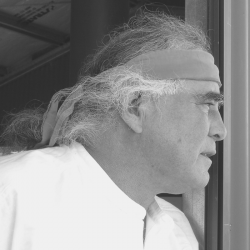Kev Carmody
- Home
- Kev Carmody
Kev Carmody

Kev Carmody is one of Australia’s pre-eminent wordsmiths whose politically charged, and socially aware lyrics have cemented him as one of our country’s contemporary voices. Of Aboriginal and Irish heritage, both cultures famous for oral histories in song, Kev was born to be a story-teller. His compositions include ‘From Little Things Big Things Grow’ with Paul Kelly which is based on the story of The Gurindji Strike and Vincent Lingiari in their struggle for indigenous land rights and reconciliation.
Born in 1946, Carmody grew up on a cattle station in the Darling Downs area of south eastern Queensland. His family were drovers and stockmen who lived largely off the land, growing vegetables near the house and hunting. Around the stockmen’s fire he learned his love for storytelling and music. When he was ten, Kev Carmody and his brother were taken from their parents and sent to a ‘Christian’ school. Without completing his senior school years he returned to hard physical rural work for the next seventeen years.
His turning point came, when at the age of 33, Kev enrolled in the Darling Downs Institute of Advanced Education to study geography, history and music, progressing through to PhD studies at Queensland University. To make Kev more comfortable with the oral side of his studies, his lecturers allowed him to bring along his guitar to his first tutorial to allow him time to learn to write and construct an academic essay. Kev had never been into a library before and had never read a book.
While at university Kev Carmody also took the opportunity to acquaint himself with experimental music pioneers John Cage and Karlheinz Stockhausen. Although his music would reflect his own Murri culture, expressed in the social history song traditions of Woody Guthrie and Huddie Ledbetter, Kev was never going to be an ordinary or traditional singer-songwriter. There’s been musical imagination as well as lyrical passion.
He released his first album ‘Pillars Of Society’ in December 1987. Rolling Stone magazine described the album as “The best album ever released by an Aboriginal musician and arguably the best protest album ever made in Australia”. Four studio albums followed: ‘Eulogy (For A Black Person)’ (Nov 90), ‘Bloodlines’ (Jul 93), ‘Images And Illusions’ (Sep 95) ‘Mirrors’ (May 04).